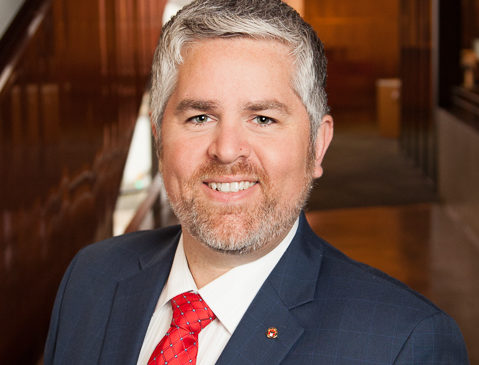After one year on Council, Flannigan having the time of his life
Wednesday, January 3, 2018 by
Jack Craver Council Member Jimmy Flannigan said his first year on the dais has been defined by “many, many, many little victories.” And that’s how city government is supposed to work, he insists.
“Municipal issues are by and large about filling potholes and picking up the trash,” he said during an interview at his City Hall office in mid-December.
He recalled talking to a friend who was considering running for office and pooh-poohed the idea of serving on City Council, which lacked the opportunities to “slay dragons” presented by state or national offices.
“But these are the real issues,” Flannigan remembers telling his friend.
Flannigan came to office after beating former Council Member Don Zimmerman, the conservative firebrand who he narrowly lost to in the first election for the 10-1 Council in 2014. Flannigan contrasted himself with the controversial Zimmerman by pledging to be a pragmatic voice for the far-Northwest District 6. Although he was backed by Democratic and progressive groups, Flannigan rarely speaks in ideological terms.
While Flannigan’s focus remains on the nitty-gritty of city policy, he worries that the toxic national political climate is beginning to trickle down to local politics.
“What has been troubling has been the tenor and the divisiveness,” he said. “Advocates or constituents are throwing around the same phrases that are coming out of the president’s mouth.”
CodeNEXT, the still-developing effort to overhaul the city’s Land Development Code, is a notable example of an issue that has been distorted by misinformation, said Flannigan, pointing to groups opposed to the effort.
“It has been far more divisive than I think is warranted,” he said. “I don’t think the city is served when either Council or when the public uses exceedingly inflammatory rhetoric.”
Along with Council members Pio Renteria, Delia Garza and Greg Casar, Flannigan has called for a new code to allow more housing in the city to be built, describing the lack of supply as one of the forces driving rents up and making Austin increasingly unaffordable for those of modest means.
More market-rate housing alone won’t solve the affordability crisis, said Flannigan. But it’s one piece of the puzzle.
Flannigan also hopes the future code will discourage sprawl and facilitate transit by allowing more development in the urban core. He points to the rapid population growth in his own suburban district as evidence that the status quo is encouraging sprawl, environmental degradation and ever-worsening traffic.
Unlike his predecessor, who regularly dismissed public transit as a boondoggle, Flannigan said that his district “wants more transit,” pointing out that his constituents likely use the Capital Metropolitan Transportation Authority’s much-maligned rail service more than anybody else. The more the city continues to sprawl, however, the harder it is to build effective transit.
Flannigan was one of only three Council members to vote against the Fiscal Year 2017-18 budget approved in September. He said he was disappointed that Council is allowing its budget reserve to dip below 12 percent, a departure from city policy.
“If you’re at 12 percent, there’s nowhere to go. There’s no actual flexibility,” he said.
Despite a booming stock market and low unemployment nationally and locally, Flannigan is far from convinced that a downturn isn’t lurking around the corner.
“If the national economy downshifts, this community is going to demand that we maintain all of the current services that we provide” despite a decline in tax revenue, he said.
It’s not uncommon for Flannigan to strongly criticize proposals he disagrees with on the dais, but he said that he gets along well with “almost all” of his colleagues.
“I don’t think any Council member begrudges another for being bold and for passionately advocating their position,” he said. “I also don’t expect to get unanimous support for my ideas, because I don’t need unanimous support for my ideas.”
Flannigan also does not shy away from getting involved in other races that he believes might affect his constituents, and said he absolutely plans on endorsing in the 2018 mayoral race, although he declined to speculate on the record about who he might support.
The only gay member of Council, Flannigan was happy to play a role in the creation of the LGBTQ Quality of Life Advisory Commission, which debuted earlier this year.
He also proudly noted that he had an appointee to every city commission within three months of taking office. That stands in strong contrast to the situation under Zimmerman, who left a large number of commission positions vacant.
Overall, Flannigan likes his job.
“When a politician says that it’s truly an honor to serve, it sounds disingenuous. But it truly is,” he said. “I’m having the time of my life.”
Photo courtesy of the city of Austin.
The Austin Monitor’s work is made possible by donations from the community. Though our reporting covers donors from time to time, we are careful to keep business and editorial efforts separate while maintaining transparency. A complete list of donors is available here, and our code of ethics is explained here.
You're a community leader
And we’re honored you look to us for serious, in-depth news. You know a strong community needs local and dedicated watchdog reporting. We’re here for you and that won’t change. Now will you take the powerful next step and support our nonprofit news organization?






